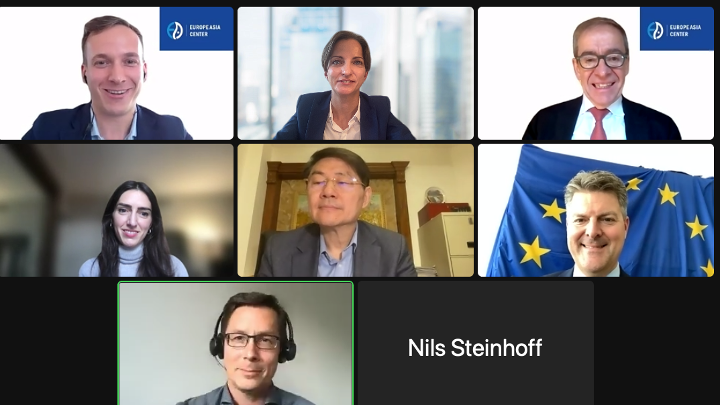[Webinar Recap] DMA & DSA: Opportunities and Challenges for EU-China Relations
2022. 10. 31
[Webinar Recap] DMA & DSA: Opportunities and Challenges for EU-China Relations

On October 18, Ms. Mireia Paulo, Senior Consultant at A&Z Law Firm, and Arbitrator/Mediator at the Shanghai International Arbitration Centre, participated in a webinar on the topic “Digital Markets Act (DMA) and Digital Services Act (DSA) – Opportunities and challenges for EU-China relations” organized by the Europe-Asia Centre, Brussels. A high-level dialogue with European Parliament’s member and lead rapporteur Dr. Andreas Schwab and Dr. Wang Huiyao, President of China Center for Globalization (China).

From left top to down: Mr Matic Gajsek, Deputy Director, Europe – Asia Center, Belgium; Ms. Mireia Paulo; Ambassador (ret.) Piet Steel, Chairman of Europe-Asia Centre, Belgium; Maria Adele Carrai, Assistant Professor of Global China Studies at NYU Shanghai (China) (academic); Dr. Wang Huiyao, President of China Center for Globalization (China); H.E. Dr. Andreas Schwab, Member of the European Parliament (EPP Group) and lead on the Digital Markets Act (Germany); Mr. Sebastian Hallensleben, Chair of CEN-CENELEC JTC 21, expert advisory board of EU StandICT and co-chair of OECD ONE.AI group (Germany) (academic – applied framework).
The Digital Services Act Package
Source: European Commission. Last update 12 October 2022
The European Commission proposed two legislative initiatives to upgrade rules governing digital services in the EU: the Digital Services Act (DSA) and the Digital Markets Act (DMA).
The DSA and DMA have two main goals:
1.to create a safer digital space in which the fundamental rights of all users of digital services are protected;
2.to establish a level playing field to foster innovation, growth, and competitiveness, both in the European Single Market and globally.
What are Digital Services?
Digital services include a large category of online services, from simple websites to internet infrastructure services and online platforms.
The rules specified in the DSA primarily concern online intermediaries and platforms. For example, online marketplaces, social networks, content-sharing platforms, app stores, and online travel and accommodation platforms.
The DMA includes rules that govern gatekeeper online platforms. Gatekeeper platforms are digital platforms with a systemic role in the internal market that function as bottlenecks between businesses and consumers for important digital services. Some of these services are also covered in the Digital Services Act, but for different reasons and with different types of provisions.
Next Steps
The DSA will be directly applicable across the EU and will apply fifteen months or from 1 January 2024, whichever comes later, after entry into force. As regards the obligations for very large online platforms and very large online search engines, the DSA will apply from an earlier date, that is four months after their designation.
As of 12 October 2022, the DMA was published in the Official Journal. Once the DMA enters into force, it will become applicable six months later. The designated gatekeepers will have a maximum of six months after the designation decision by the Commission to ensure compliance with the obligations laid down in the Digital Markets Act.
Will the DMA and the DSA affect Chinese companies?
Based on different sources, including the DMA Impact Assessment Support Study (2020), the ten companies that are most likely to be identified as gatekeepers are all US firms. Potential Chinese enterprises could be TikTok. Even if currently most of the Chinese Firms do not fulfil the DMA criteria to reach thresholds, Chinese platforms are likely to eventually meet the gatekeeper criteria.
Like Europe, Chinese policymakers and regulators are trying to regulate domestic digital market to address the monopolistic power of tech giants and potential abuses vis-à-vis business users and consumers. New legislation is issued to regulate online platform behaviours and related issues such as consumer protection, data protection, content moderation, and suppression of fair competition. These steps echoe the European tendency to level up the regulatory scrutiny of the online platforms. As the DMA, Chinese regulators are mostly concerned with the competitiveness and fairness of digital market. Equally to the DSA’s goal, Chinese regulations aim to improve online safety, regulation of content, and increase transparency.
There is also a similar dichotomy that both governments face, which is the internal market and free movement of data, and at the same time, data protection. Data as a production resource may cause ambiguity in data protection, such as lowering protection standards for the sake of enhancing competition.
In both jurisdictions, regulation seeks to ensure a level playing field so that emerging competitors do not get quashed and set up rules of conducts so that users (especially business users) of large digital platforms are treated fairly. We can highlight a few Chinese laws and regulations that show similarities with the EU legislation towards regulate domestic digital market and address the monopolistic power of tech giants. For instance:
1.Anti-monopoly Guidelines for the Platform Economy. It was issued and implemented by the Anti-Monopoly Committee of the State Council of China on February 7, 2021. It clarifies the application of the Anti-Monopoly Law. This Guidelines send a clear message to the online platforms that antitrust enforcement could be activated to counter anti-competitive practices and the resulting harm to the consumers’ interests.
2.Anti-monopoly Law of the People's Republic of China (amended in 2022). Into effect on August 1st, 2022. Article 22 stipulates that operators with market dominance shall not use data, algorithms, technologies, and platform rules to engage in the abuse of market dominance prohibited by this Law.
3.The Guidelines of Classification and Grading of Internet Platforms (Draft for Comment). It was issued by China State Administration of Market Supervision on October 29th, 2021. It clarifies the grading standards of Internet platforms. Like the DMA, it divides Internet platforms into super, large, and SME platforms according to user scale, business types, and restriction capabilities. However, there are differences in both legislative texts regarding specific amounts in the standards of user scale.
4.Guidelines for Implementing Entity Responsibilities of Internet Platforms (Draft for Comments). It was issued by China State Administration of Market Supervision on October 29th, 2021. It clarifies the division of responsibilities of platforms in data security, security audit, anti-monopoly, anti-unfair competition, IP protection and network security. Yet, it is not as detailed as the EU DMA.
5.Articles 1194-1197 of the Civil Code. It came into effect on January 1, 2021. It specifies the tort liability of internet service providers. Specifically, Article 1194 stipulates the general rules of internet infringement liability and applies the imputation principle of fault liability. Article 1195 stipulates the notification right and its exercise rules for safety, including the necessary conditions for the obligee to exercise the notification right, the obligation of the internet service provider to transfer the notification and take necessary measures, and the liability of the obligee for wrong notification. It is similar to the “notification-action” mechanism in EU DSA, although China's rules also prevent the abuse of notification right in practice by stipulating the responsibility of false notification.
6.Regulations on Prohibiting Abuse of Market Dominant Position (draft for comments). It was issued on June 27, 2022. The State Administration of Market Supervision of China issued a notice soliciting public opinions on listing the prohibited behaviours of platforms with market dominant position and increasing the manifestations and legitimate reasons for platform operators with market dominant position to implement “self-preferential treatment”.



